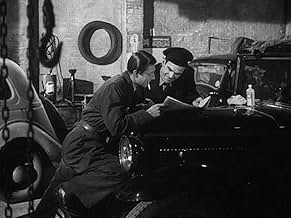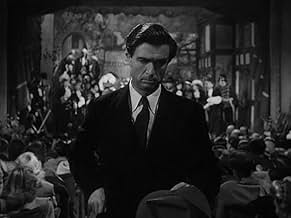Adicionar um enredo no seu idiomaOn the south west coast of England, two crusading reporters revive a failing newspaper and expose local corruption.On the south west coast of England, two crusading reporters revive a failing newspaper and expose local corruption.On the south west coast of England, two crusading reporters revive a failing newspaper and expose local corruption.
- Direção
- Roteiristas
- Artistas
Patric Doonan
- Burton
- (as Patrick Doonan)
Andy Alston
- Police Constable at Court
- (não creditado)
Stanley Baker
- Barnes
- (não creditado)
Avaliações em destaque
What more could you want. Lovely views of Lyme Regis, still looks much the same, and small town politics. As a former Mayor at a neighbouring town I can tell you that little has changed in respect of infighting on grandiose schemes to improve local amenities. They still have Operatic groups and fuctions raising money for good causes, British Legion, RNLI etc.
The stars are numerous, 10 seconds of Stanley Baker, Patrick McNee and Bryan Forbes in early roles. Worth watching!
First the good news: lovely photography of Lime Regis in summer. But the bad news is that a number of things let this film down. Firstly the lead - Norman Moreland, a tall handsome classical actor but without star quality or personality. Secondly a lack of wit and sensitivity in the screenplay. Thirdly a rather unsympathetic plot.
I'm not sure if the resemblance was coincidental but Moreland physically and in the clothing closely resembles actor James Stewart and the film and part resemble - but fall far short of - a number of classic James Stewart comedies. The difference is that Stewart's screen persona was perfectly served by the scripts: the audience's sympathies and emotions perfectly manipulated. Here the screenplay is, like the main characters, rather clumsy and not really sympathetic. The female lead (Sarah Churchill) too was all set to marry Moreland but angrily rejects him when she discovers that marriage will not provide her an escape to London. Ealing comedies would never have been so clumsy with characters. Even the "villains" (Fabia Drake and James Hayter - always exceedingly good) in this film had more personality and in a way more engaging and certainly more entertaining than the two do-gooders who while they blast open the small town cronyism and corruption, are in their way intolerant overbearing know-alls. It perhaps though accurately reflected the times with division between those who spent the war at home unchanging provincial narrowness and those whom the war was transformative - seeing the world, seeing and having responsibility for decisions over life and death. The screenplay needed to have sketched this rather than assume the audience necessarily knew and were sympathetic.
Some reviews of the time were uncommonly uncomplimentary: "The New York Times described it as a "slow, dogmatic little picture" with a "dog-eared" plot. In The Times, the film's plot was seen as unoriginal, executed "without inspiration or any originality of thought" (Wikipedia) The criticism of the plot seems though unduly harsh - a film about the (local) press being in bed with advertisers and business interests the local people overturning it is not a common one.
A 6.5 - it could have been an 8. Moreland as an actor performed the script he was given but added nothing. A star such as Kenneth More would most likely have seen a need for changes to it. It's what made "Genevieve" such a classic - More played a loud selfish and insensitive man often maddening his wife - but with periodic self-awareness and redeeming charm - script and actor in perfect harmony.
I'm not sure if the resemblance was coincidental but Moreland physically and in the clothing closely resembles actor James Stewart and the film and part resemble - but fall far short of - a number of classic James Stewart comedies. The difference is that Stewart's screen persona was perfectly served by the scripts: the audience's sympathies and emotions perfectly manipulated. Here the screenplay is, like the main characters, rather clumsy and not really sympathetic. The female lead (Sarah Churchill) too was all set to marry Moreland but angrily rejects him when she discovers that marriage will not provide her an escape to London. Ealing comedies would never have been so clumsy with characters. Even the "villains" (Fabia Drake and James Hayter - always exceedingly good) in this film had more personality and in a way more engaging and certainly more entertaining than the two do-gooders who while they blast open the small town cronyism and corruption, are in their way intolerant overbearing know-alls. It perhaps though accurately reflected the times with division between those who spent the war at home unchanging provincial narrowness and those whom the war was transformative - seeing the world, seeing and having responsibility for decisions over life and death. The screenplay needed to have sketched this rather than assume the audience necessarily knew and were sympathetic.
Some reviews of the time were uncommonly uncomplimentary: "The New York Times described it as a "slow, dogmatic little picture" with a "dog-eared" plot. In The Times, the film's plot was seen as unoriginal, executed "without inspiration or any originality of thought" (Wikipedia) The criticism of the plot seems though unduly harsh - a film about the (local) press being in bed with advertisers and business interests the local people overturning it is not a common one.
A 6.5 - it could have been an 8. Moreland as an actor performed the script he was given but added nothing. A star such as Kenneth More would most likely have seen a need for changes to it. It's what made "Genevieve" such a classic - More played a loud selfish and insensitive man often maddening his wife - but with periodic self-awareness and redeeming charm - script and actor in perfect harmony.
An RAF pilot returns to his job as a newspaper reporter in a small seaside town. At first he questions the importance of writing about the local goings on, but after unexpectedly becoming the editor, he decides to use the paper for the betterment of the community. In the process, he finds himself romantically involved with the woman who filled his job while he was serving in the war. This is a droll comedy that falls somewhere between Frank Capra and Preston Sturges in it's take on small town British life. All the characters are nicely written and acted, with a vein of dry wit running throughout the film (the local undertaker in particular). Fans of "The Avengers" can spot Patrick MacNee in a small role. If you're a fan of the Ealing comedies, this would be a "must see". It is, in any case, an entertaining and uplifting film.
Filmed mostly outdoors in and around Lyme Regis In Dorset way back in 1949. The year British Cinema's saw there all time record for admissions, from 1949 though later than in the USA that new must have consumer product called the television set would slowly slice and dice the Cinema exhibition industry to pieces.
Yet back in 1949 Britain genuinely had a homegrown film industry that produced quality films for domestic consumption, we all know the best of them, but i doubt if many connoisseurs of historic British films, let alone students of the post war era would list this title among the greats. Yet all who know this minor gem will surely agree, this movie is a triumph, the plot about the saving of a small town rag and a token romance to egg out the running time, is your lot for plot. Not that plot matters as this is a movie primarily about Englishness and how the English saw themselves way back then. History and time have been very generous to this film, the location Lyme Regis has changed surprisingly little and that most lovely of South West towns really is the star of the film, as it was in 1949 and it still will be in 2019 which will be very very soon. 70 years may of passed but the skill of the film makers who made this little wonder shines down through the decades. So do try to hunt down this wonderfully English/English of films and enjoy. This is little England now long long gone, yet still alive to all of us, if only on celluloid.
I caught this movie on UK's Talking Pictures channel. In no way can it be described as a comedy, certainly not an Ealing Comedy. If anything it is a British attempt at lightish touch social realism in the changed Post WW2 era.
Você sabia?
- CuriosidadesFollowing the opening credits there is a travel poster based on the famous ones issued by the rail companies, which reads: TORMOUTH for SUNNY HOLIDAYS GET THERE FASTER ON BRITISH RAILWAYS
- Trilhas sonorasLibretto for the Operetta 'The Prodigal Princess'
Music by Temple Abady (uncredited)
by Stafford Byrne
Produced by Desmond Davis (as Desmond Davies)
Principais escolhas
Faça login para avaliar e ver a lista de recomendações personalizadas
Detalhes
- Tempo de duração1 hora 23 minutos
- Cor
- Proporção
- 1.37 : 1
Contribua para esta página
Sugerir uma alteração ou adicionar conteúdo ausente

Principal brecha
By what name was All Over the Town (1949) officially released in Canada in English?
Responda






























